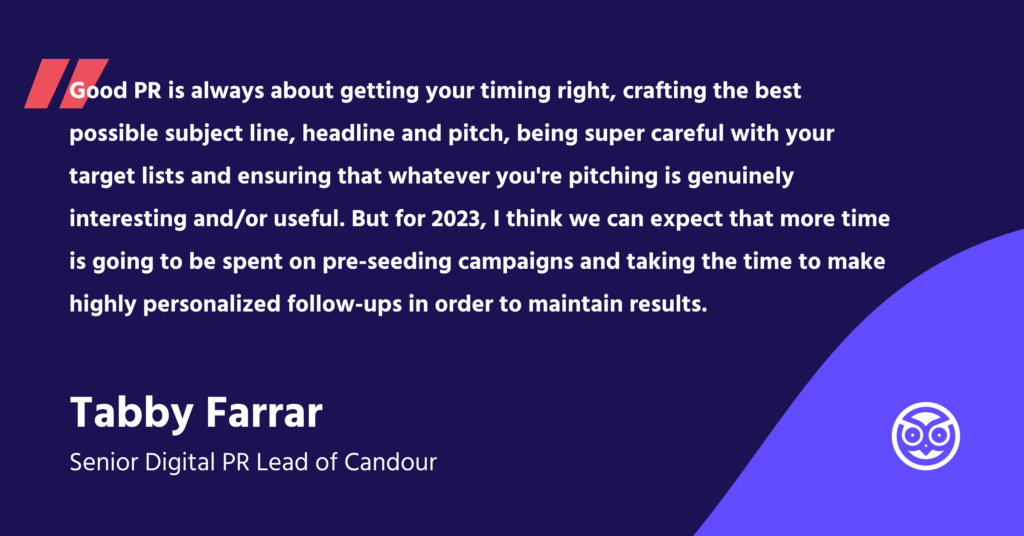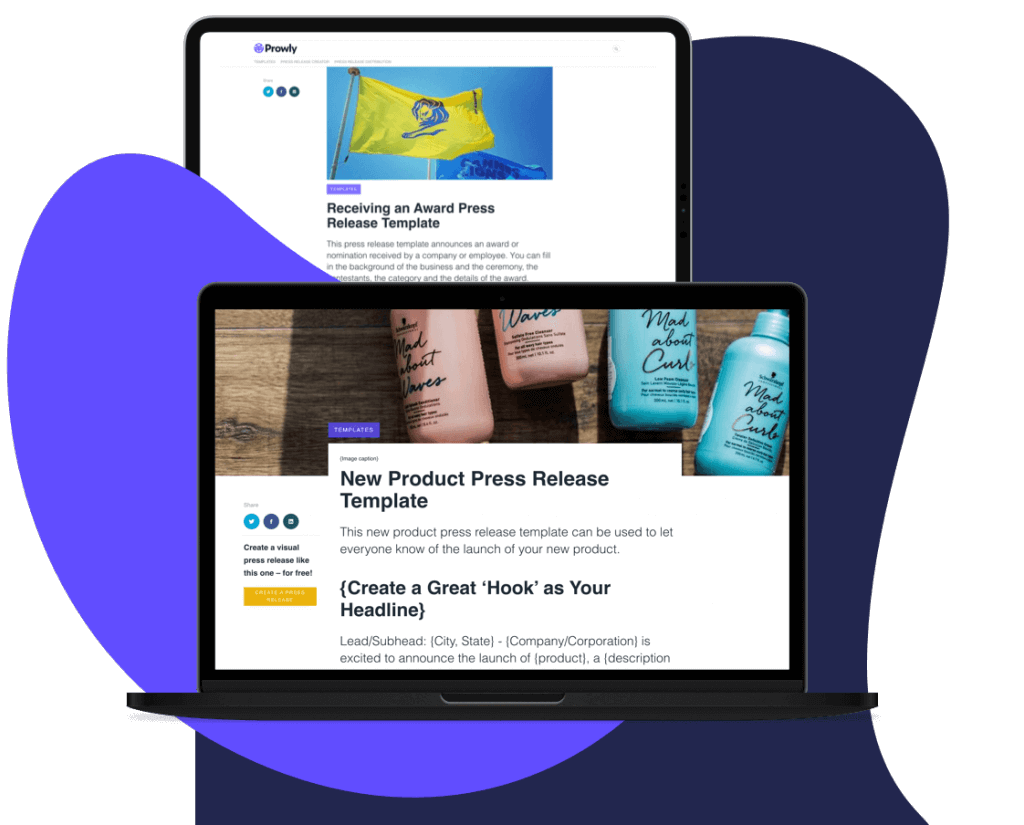This is the beginning of the new year and we decided to prepare something special for you — a Special Edition of #PRChat.
In this chat, we’ll talk with CEOs and PR experts about the latest trends, anti-trends and challenges in PR, and also discuss how to navigate them. From the increasing importance of SCR strategies to the rise of micro-influencers, we’ll explore the changes that are shaping the industry and offer tips on how to stay ahead of the curve.
Our special guests today will be:
- Claire Bahn, CEO and Co-Founder of the Claire Bahn Group
- Simon Brisk, Co Founder of Click Intelligence
- Daphne Tse, Digital PR Strategist at Seoplus+
- Yoav Morder, Search & PR director at Ryze
- Steve Saleeba, Senior Director of Accounts and Media Relations at Hollywood Agency
- Tabby Farrar, Senior Digital PR Lead of Candour
- Matias Rodsevich, CEO of PRLab
1. What are the most notable PR trends that are currently shaping the industry?
💬 Claire Bahn, CEO and Co-Founder of the Claire Bahn Group:
“2023 PR will continue to see growth in audience expectations for clarity and consistency with company social responsibility initiatives, not only for the company itself but also for the leaders of the company. With the abundance of access consumers have to the personal profiles of executives and founders, it is no longer an option for those leaders to just go along with the company’s social work behind the scenes. They must also promote those values through their own personal brand if they want the public to believe they are sincere in their efforts.”
💬 Simon Brisk, Co Founder of Click Intelligence:
“As per my observations, we need to focus on mission and value-based storytelling. The year 2020 marked a turning point for several brands. DE&I (diversity, equity, and inclusion) became a global priority. The focus on mission- and value-based storytelling for all brands will continue to be a part of this 2023 PR trend. People prefer to support businesses that share their values!
However, customers must first see those principles put into practice; this involves genuinely walking the walk, taking responsibility, and emphasizing your client’s commitment to action. Put socially aware storytelling at the top of your priority list while developing pitches and press strategy.
Secondly, the comeback of live, in-person events is one of the most exciting 2023 PR trends as the world is starting to open up again. To promote your clients and your agency, take advantage of opportunities like industry conferences, pop-up shops, and networking events. There are countless options! Work with your clients to rethink their launch strategies to include live events again. However, remember that some customers still need time to adjust to IRL situations. You can start with smaller events or use a hybrid approach with a virtual component to reach individuals at home.”
💬 Daphne Tse, Digital PR Strategist at Seoplus+:
“I think we will continue to see more companies discuss DEI efforts and healthy workplaces on social media. I think when companies are transparent about how they operate as a company, their credibility and trust in the public increases. In addition, I think companies will start to pull back from new tech and AI and focus on organic content to generate more organic responses. This might mean posting or launching campaigns to better relate to their target audience in order to earn their trust.”
2. What are some of the strategies in PR that are falling out of favor or becoming less effective?
💬 Yoav Morder, Search & PR director at Ryze:
“In 2023, we should leave behind paid media coverage. Businesses have a tough financial year ahead where inflation and recession make it hard for businesses to allocate handsome marketing budgets to drive results. Undoubtedly, paid media coverage helps increase and boost visibility instantly, but for the upcoming year, it will not be a financially healthy activity for PR.”
💬 Steve Saleeba, Senior Director of Accounts and Media Relations at Hollywood Agency:
“I’m in the camp that all of these elements should continue to play an important role in brands’ efforts to reach various groups of stakeholders, but they need to be executed properly.
If I had to expand on what I consider to be the less important trends, I believe in-person events are more powerful in terms of personal connection, but online events still reach people who aren’t local and can’t travel. Press releases should be used less as a tool to reach media, and more as a company news announcement. They can live in your online newsroom, on social media, and with wire services, which can boost SEO.
If I had to pick one to leave behind, it’d be aiming for viral campaigns. Think of marketing as an investment strategy or as a classic sports analogy, it comes down to a simple risk-reward analysis. A properly employed, integrated marketing program is going to guarantee you a significant and steady return. When you have all those fundamentals in place, you can afford to take the occasional risk (swinging for the fences, half-court shots, buying “the next bitcoin”) with the knowledge that the odds are not in your favor.”
3. What are some of the anticipated challenges that PR professionals will face in 2023 and how can they address them?
💬 Tabby Farrar, Senior Digital PR Lead of Candour:
“I think the biggest challenge for the year ahead is going to be standing out in an ever-expanding sea of PRs and pitches. Journalists who used to tell us they were getting anywhere from 15-50 pitches a day are now receiving 600-800, and while we can assume that many are irrelevant or poorly-targeted, it also seems as though the digital PR industry has expanded at a disproportionately high rate in the last two years as more and more businesses have looked at ways to increase their online presence.
There are more people creating and pitching PR campaigns and a broader range of client budgets being catered to than ever before. Plus, the digital PR boom has caused traditional PR agencies to try and pivot into using tactics like content-led and survey-led outreach that were once the domain of SEO-oriented PR professionals. When you bring it all together, it’s not just an increase in the sheer number of pitches – it’s an increase in the number of genuinely useful and interesting campaigns and great headlines, which means work that would have almost guaranteed widespread coverage 3 years ago may not even be opened now.
Some PR people prefer not to send follow-ups, others will follow up over the phone – how and when you nudge after pitching should be determined by the journalist’s personal preference wherever possible, but for me it’s not an option to just not follow up at all.
Recently, I had three writers from national newspapers in the UK come back to me asking to have a story as an exclusive in response to the second follow-ups that I sent them. They had genuinely missed the initial pitch and the first follow-ups in their inboxes, but all three loved the story so much they wanted to be the first to run it. I think that says a lot about how much harder it is to get coverage now compared to a few years ago.
Good PR is always about getting your timing right, crafting the best possible subject line, headline and pitch, being super careful with your target lists and ensuring that whatever you’re pitching is genuinely interesting and/or useful. But for 2023, I think we can expect that more time is going to be spent on pre-seeding campaigns and taking the time to make highly personalized follow-ups in order to maintain results.”

Matias Rodsevich, CEO of PRLab:
💬 “As demands have grown, becoming both a generalist and a specialist has become necessary. Prioritizing will be crucial, as will outsourcing minor duties when required. While many of us would like to do everything all at once, that’s not possible. The biggest challenge to succeeding in the industry in 2023 will be the need to continuously upskill in one or several areas, especially in light of the economic situation. Larger, expensive agencies will likely suffer, so smaller, less costly agencies should upskill to prepare.”


